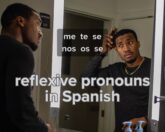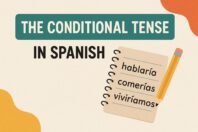GO Verbs In Spanish: What You Need To Know

Get our free email course, Shortcut to Conversational.
Have conversations faster, understand people when they speak fast, and other tested tips to learn faster.
More infoYou may or may not have heard the term “go verbs in Spanish”, or perhaps even “yo-go” verbs.
So what exactly do you mean by these verbs?
In basic terms, these two terms refer to a list of irregular verbs that when conjugated in the present indicative, always end in “go” in the first person (yo) form.
For example:
- Hacer: Yo hago (I do),
- Poner: Yo pongo (I put),
- Tener: To tengo (I have)
When we talk about go verbs in Spanish, we only refer to verbs ending in IR or ER. In other words, there are no AR verbs in this category.
Now, let’s divide go verbs in Spanish into three different categories.
1) The Verb “Hacer” And Related Ones
The verb hacer (to do/make) is probably the most used go verb in Spanish, as it’s completely irregular in the first person conjugation.
There are certain go verbs that are formed using hacer with a different prefix, like rehacer (to redo) and deshacer (to undo).
While these prefixes change the meaning of the main verb, the conjugation pattern will remain the same as the original verb (hacer).
| Personal Pronouns | Hacer / To do | Rehacer / To redo | Deshacer / To undo |
| Yo | hago | rehago | deshago |
| Tú | haces | rehaces | deshaces |
| Usted/él/ella | hace | rehace | deshace |
| Nosotros/as | hacemos | rehacemos | deshacemos |
| Ellos/as | hacen | rehacen | deshacen |
| Ustedes | hacen | rehacen | deshacen |
2) The GO form
We can call the second category of go verbs in Spanish, the go form verbs.
These forms are conjugated as regular in the present indicative, except for the first person conjugation (yo) form, where you must add a g before the suffix -o.
Some of these verbs include Poner, Oír, Salir, Tener, Valer, Venir, among others (and related ones).
Let’s take the verb poner, which means “to put”.
When conjugated in the first person (yo) simple present indicative, it becomes pongo, rather than “pono”.
Let’s take a look at more examples.
| Personal Pronouns | Salir/To go- To leave | Tener / To have | Venir / To come |
| Yo | salo – sal+g+o= salgo | tene- ten+g+o= tengo | veno- ven+g+o= vengo |
| Tú | sales | tienes | vienes |
| Usted/él/ella | sale | tiene | viene |
| Nosotros/as | salimos | tenemos | venimos |
| Ellos/as | salen | tienen | vienen |
| Ustedes | salen | tienen | vienen |
3) Verbs with -IGO form
Finally, we have a group of verbs that use a regular conjugation, with the exception being that fact that you must add a –ig before the suffix -o in the first person conjugation (yo)
These verbs include Traer, Caer.
Let’s take a closer look at examples of this rule in action.
| Personal Pronouns | Traer / To bring | Caer / To fall |
| Yo | trao -tra+ig+o=traigo | cao -ca+ig+o=caigo |
| Tú | traes | caes |
| Usted/él/ella | trae | cae |
| Nosotros/as | traemos | caemos |
| Ellos/as | traen | caen |
| Ustedes | traen | caen |
As you can see above, only the first person conjugation in the simple present is affected by this.
GO Verbs In Spanish: Exercises
Conjugate the following verbs in parentheses in the simple present tense:
- Yo ____ (tener) un dolor de cabeza. (I have a headache.)
- Yo _____ (caer) de la cama y me golpeo la cara. (I fall off the bed and hit my face.)
- Yo ____ (poner) una demanda a mi abogado por extorsión. (I put a lawsuit to my lawyer for extortion).
- Yo _____ (traer) la torta para el cumpleaños de mi mamá. (I bring the cake for my mother’s birthday.)
- Edward _____ (tener) problemas de salud. (Edward has health problems.)
- ¿Mi papá ______ (venir) con nosotros) (My father is coming with us?)
- Yo no (valer) 1000$ porque no soy un objeto. (I am not worth $1000 because I am not an object)
- Yo (salir) del trabajo a las 10 pm. (I leave work at 10pm.)
- Yo _____ (oír) un ruido de ese cuarto. (I hear a noise from that room.)
- Yo siempre ______ (poner) una sombrilla en mi bolso antes de salir. (I always put an umbrella in my purse before leaving.)
GO Verbs In Spanish: Answers
- Yo tengo un dolor de cabeza. (I have a headache.)
- Yo caigo de la cama y me golpeo la cara. (I fall off the bed and hit my face.)
- Yo pongo una demanda a mi abogado por extorsión. (I put a lawsuit to my lawyer for extortion).
- Yo traigo la torta para el cumpleaños de mi mamá. (I bring the cake for my mother’s birthday.)
- Edward tiene problemas de salud. (Edward has health problems.)
- ¿Mi papá viene con nosotros (Is my father coming with us?)
- Yo no valgo 1000$ porque no soy un objeto. (I am not worth $1000 because I am not an object)
- Yo salgo del trabajo a las 10 pm. (I leave work at 10pm)
- Yo oigo un ruido de ese cuarto. (I hear a noise from that room)
- Yo siempre pongo una sombrilla en mi bolso antes de salir. (I always put an umbrella in my purse before leaving)



